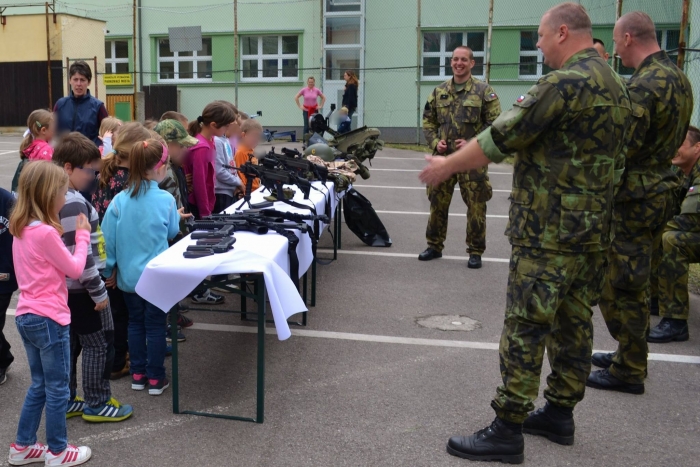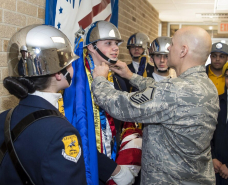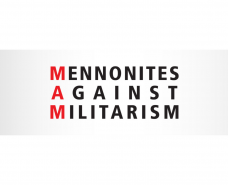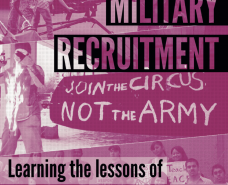Militarisation of Youth in the Czech Republic

Hana Zoor Svačinková, NESEHNUTÍ
As part of the International Week of Action Against the Militarisation of Youth, we conducted this interview with Petra Frühbauerová who works for the NGO NaZemi, focusing on global education. Petra is part of the team preparing a permanent conference of educational associations on the way young people's education in the Czech Republic relates to defense.
Hana Svačinková: What brought you to the subject of militarisation of youth and related issues?
Petra Frühbauerová: At first it was the shooting of the documentary film Teaching War with the director Adéla Komrzý during the protests against the arms fair IDET with NESEHNUTÍ in 2015. She was filming in schools and we used to talk about what was happening there. It was a surprise for me that I did not notice it, even though I work in education. Based on Adéla’s suggestion I looked into how the education of the state defense is worked into educational programs that have to be followed at middle schools. It turned out that the whole process was rather subtle, even my colleagues focusing on educational politics did not notice it. I never called it militarism myself, but there were things that I considered potentially dangerous. I think it is because my field is not militarisation but global citizen education, therefore I am perceiving wider context of the issue - in our relating to the world on the different levels.
What were the major issues of the program Preparation for the state defense (POKOS) according to you?
I was seeing issues on a number of different levels. The first issues were the manner in which the programs – which were established by the Ministry of Defence and realized by the Army of the Czech Republic – were executed. There were problems in the execution of the program themselves, for example, kids were allowed to manipulate real guns without prior safe manipulation instructions. We were made aware of this by certain soldiers who witnessed the execution of the programs. There was also a problem with how the lecturers (who are soldiers), treat the kids.
The second thing is the guidelines for teachers, published by the Ministry of Defence. The profiling of the materials is very narrow and they are mostly about the activities of military character, like the programs themselves. Non-military crisis resolution is completely missing, for example - flood management - though the soldiers are part of the relief missions as well. The whole peaceful conflict resolution theme is either very poorly presented in the programs or not at all. Even though soldiers take part in the resolution of humanitarian crisis, this presentation narrows the context in which the children perceive the purpose of the army, and armed conflicts in general.
The third issue is whether the army should go into schools at all. That is the most controversial subject in the discussion. Is it OK that there is an armed component of the state that is usually used only in extreme situations present in schools? Is it necessary for the children to see soldiers to understand the role of the army? My position is that they shouldn’t be there, even though I am open to the discussion. I believe that we can achieve the same goals through much safer and more effective ways. But this is something that we, along with other education organizations, are not focussing on right now as we are targeting our shared and most pressing issue: how the programs are functioning.
Another risk that the Ministry of Defence is already aware of is who else is going to be allowed access to schools as part of the integration of “state defense” into the school curriculum. Some of the teachers are struggling with this topic so they look for outside support and the army doesn’t have enough capacity to go to all the schools that ask for it. There is a danger that the school could actually invite someone from a paramilitary group or militia.
Are there any initiatives in Czech civil society that systematically oppose the manner of execution of the POKOS programs?
The topic is followed by the Permanent Conference of Educational Associations (SKAV) which is a network of almost thirty educational associations, programs, and NGOs. This platform has been focusing on education in its broader sense for a long time, and it is this organization that gets to deal with the politicians. Its members decided that the state defense is such an important issue that it is necessary to deal with it. We started with asking the Ministry of Defence and the Ministry of Education particular questions: we sent them an official letter and wanted their testimony on issues that we considered dangerous. Both of the ministries failed to respond in a given period so we had to push for a response. When we received a response we found out that some of the questions were left unanswered and some of the responses contradicted each other. For example, the Ministry of Defence doesn't view the army's presentation project as an educational one, and that's what allows it to be taught by people who are not properly trained. Teachers are supposed to be present during presentations. The Ministry of Education considers the army's activities during POKOS to be educational programs and believes that the people teaching these programs are educated and qualified for teaching. A completely different issue was therefore uncovered: who is responsible for these programs that have suddenly appear in Czech schools?
We reached a joint statement, in which we express our concerns about the form of the implementation of the topic of state defense into schools. We are trying to establish support for teachers to introduce the themes in the broader context that they are supposed to be.
Could you specify some particular examples of soldier’s risky behavior during the POKOS programs that SKAV criticises?
First, it is the use weapons. Children get to manipulate weapons without prior safety instructions and without any supervision. They can take them, run around the gym freely and point at each other, which we have witnessed on many occasions. It is stated in the manual for safe manipulation that we always manipulate a gun as if it was loaded, so you are not permitted to aim it at a person. The guns weren’t presented as something that can kill, anywhere we inspected.
There was no mention of the risks and consequences of the use of weapons, and nobody taught children to respect the use of a weapon.
We also witnessed an approach from the soldiers that are in direct contradiction with modern pedagogical knowledge about the motivation of children, and how to create a safe environment. We saw authoritative behavior and swearing, for example telling children to “shut up”. We witnessed children being forced into doing things they didn’t want to do, for example when they were afraid to shoot a laser gun.
A different risk that we see is that even though the program is aimed at middle school students we saw that during the presentations there were elementary school students present as well. There was no parental consent asked for attendance at the event; the army responded to a query about this by saying that it is none of the parents' business. This is what you can hear from the Deputy of the Czech School Inspection Ondřej Andrys in the film Teaching War. Although he has argued many times that this statement was taken out of context, we asked about the consent from parents at the schools we visited, and it really was not the condition for running the program.
Regional military headquarters hold training events for teachers and I joined one with my colleague. The captain who was running the lesson casually referred to refugees as rats. We left this event deeply shaken. The army has accreditation for these trainings for further education of the pedagogical workers, which means their lectures should meet certain standards, however, that was not the case. A number of teachers have demanded bigger methodical support than that offered by the Ministry of Defence, because theirs offer theoretical information about the armed forces, but offers no methodical support.
What has changed within the POKOS program more than a year after you started to tackle this issue?
The Ministry of Defence already took into the POKOS project some measures in response to the objections we presented. Right now the children shouldn’t be given arms to hold during the programs. Guns are in school purely for demonstration and they are operated only by the soldiers. The presence of a teacher during the presentation has become a compulsory criterion for choosing schools where the project will be executed. The Ministry of Defence has stated that they now recommend that schools get parental consent and say that it is possible for the child not to join the program if their beliefs would not permit it. This month the lecturers of the lessons for teachers are for the first time at the course to learn soft skills. It means that our hard work is now yielding crops, and the management of POKOS is responding constructively to our objections. The measures should be applied in the revised manual for teachers, which should cover diplomatic or peace aspects of resolution of armed conflicts. Right now we are expecting the manual's release.
But there are other new issues: is this enough? Should there be weapons in the programs? Are the rules truly followed in reality? And most importantly, where is Ministry of Education, which is supposed to guarantee that the implementation of the program is up to scratch, and whose aim should be to support teachers broadly in the topic?
Can you describe what role the film Teaching War played in this process?
The film was important because it introduces the topic to the general public. However, some of the problematic aspects of the film are that it mixes up different contexts. The film combines army programs in schools with different programs of groups working with the youth. The film also shows shots of paramilitary groups, some of which can even be described as extremist, that don’t actually have any connection to schools, and are in the film because the director is trying to show the militarization of the whole society, not just the youth.
What is your impression of the role of parents in this context? Put simply, if they want their children to be little soldiers, isn't it their responsibility? What role does civil society play in this issue, if any?
Of course, this is not just a question of schools, it’s also about parents and how different moods in society are formed. Often there is a need to teach children how to behave in a crisis situation, the need for them to be in a good physical condition and to be able to take orders. The question is, how to fulfill this programs in schools. In the ones we saw nobody taught children what to do when porous substance escapes into the air. Nor how to perform first aid – this was only shown by the instructor performing mouth-to-mouth resuscitation on a figurine and later three children tried having their go at it, but this isn’t something that would help them in a real-life scenario. And the training lasts only a day in which their physical condition won’t improve. It has a more theoretical character.
So the necessary thing to do is to establish goals that we want to achieve – what skills children need to have? What kind of crisis situation do they need to be prepared for? Is it a military conflict or a natural disaster? And what about hybrid threats, or dealing with disinformation? Why aren’t children learning media and information literacy? These might very well be more relevant than the experience of having held a gun in their hands.
There is a certain atmosphere of fear in the society, built by media and politicians. It is possible that teachers feed into this fear by inviting army members into their schools. The founding of these educational programs was not unrelated to this context. To what level do these precautions help feed xenophobia instead of trying to solve conflicts in a constructive, peaceful way or trying to prevent causes of problems? At the same time as teaching state defense at schools happened, the Czech School Inspectorate report on civic education came out. The report says that there is an increase in xenophobia and extremism in schools and that not enough emphasis is put on human rights or solidarity. We can’t say that these two aspects should be dealt with separately. When we create the atmosphere of fear in society, supported by parents, the topic of human rights could get a context, in which it would be seen as unsuitable for the school discussions. We have to think that when we are speaking about relations, we have to speak about conflicts and their results, as well as about understanding and solidarity, because if we want to be a peaceful society capable of building a peaceful environment and world in which to live, we need to strengthen the skills that make this possible.
How can we make young people in the Czech Republic more interested in the peace movement? What is the journey towards peace in a country which, according to Global Peace Index, is one of the most peaceful countries in the world?
I think that young people are not interested in peace movements because people are not in real danger, or they do not realize that they might be in danger in the future. What can we do to make them more interested? It is necessary to condemn the efforts in the society that strive to do the opposite. It is also always important to show the broader context, to try to understand the interconnectedness of the world and how certain actions can influence the way things around us are going to evolve in the future. I think that this can be shown from historical examples, and we can also talk about scenarios that are happening somewhere else in the world right now. Maybe the understanding that we are part of something bigger than what is happening here within the Czech borders may lead to a point where peace movement won't be seen as inappropriate or useless.
You are a volunteer at NESEHNUTÍ. How do NESEHNUTÍ’s antimilitarist activities relate to the contextualising of issues you just talked about? In particular, I am interested in the efforts to make people aware about the export of Czech weapons.
NESEHNUTÍ together with NaZemi has created an educational program for high schools which deal with the topic of international armed conflicts. In simple words, it shows how important it is to view conflicts in terms of the consequences both for the victor and for the defeated and to focus on what is happening around us and how we relate to the conflicts happening on the other side of the world.
In our program, one tiny part of it is devoted to an event in which the Czech Republic tried to export arms to the Democratic Republic of Congo despite the embargo, and how the arms, in the end, were sent to their allies. The students attending the program were really interested in hearing this. For them, it was completely new information that something as such is happening; that there are regulations as to where guns can and can’t be exported to. That’s why contextualizing issues is important. This particular example was about the Democratic Republic of Congo, but we could also look at other countries where Czech arms are exported and therefore where the Czech Republic has an impact on what is happening there.
What are SKAV’s and your plans for 2018 in terms of topics that we have discussed?
At the moment SKAV is occupied with other topics because of the current election and the changes in representatives. However, I assume that we are going to go through the changes that have happened and we are going to assess the present situation and how our comments have been incorporated into these changes.
And what about my plans? Adéla and I are in touch with an organization called Free Cinema that focuses on film education. It seems like we are going to be creating a program as a follow up to the Teaching War film together. There is going to be a module that is about making the film, and also another module that deals with the topic of state defense.
At the same time, together with NaZemi we would like to devote more time to the topic of conflict resolution, whether it’s on a personal or community level or on international relations and international conflicts level, as well as discussing our role in these conflicts. We want our program to be suitable for teachers teaching 'state defense', and for it to offer a different perspective than the army’s programs. The teachers can either invite us to their lesson or teach the program themselves.
And finally, a question which might be interesting for our international colleagues – how can they provide support for our fight against militarization in the Czech Republic, or how can people support our activities?
At the moment we are doing everything as volunteers, so some money would be nice! That would enable to focus on the topic conceptually: people would have more time for this than a couple of hours at night after having done their own work. That would be marvelous. Our capacity to work on finding information is limited. It would be very helpful for us if there was an overview of how this topic is dealt with in schools across Europe, whether as a successful model to follow or a failed model to best avoid. We are familiar with a couple of examples, but not thoroughly, so at the moment we can’t use them as arguments in discussions. It would also be helpful to have support from initiatives in countries where either state's defense, defense education or militarism, in general, have been a point of public discussion, and where it was possible to find a way to teach these topics in a more constructive way.
Countering Military Recruitment

WRI's new booklet, Countering Military Recruitment: Learning the lessons of counter-recruitment campaigns internationally, is out now. The booklet includes examples of campaigning against youth militarisation across different countries with the contribution of grassroot activists.
You can order a paperback version here.








